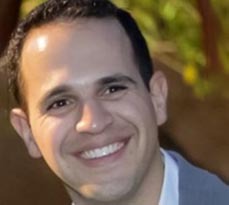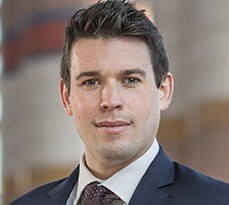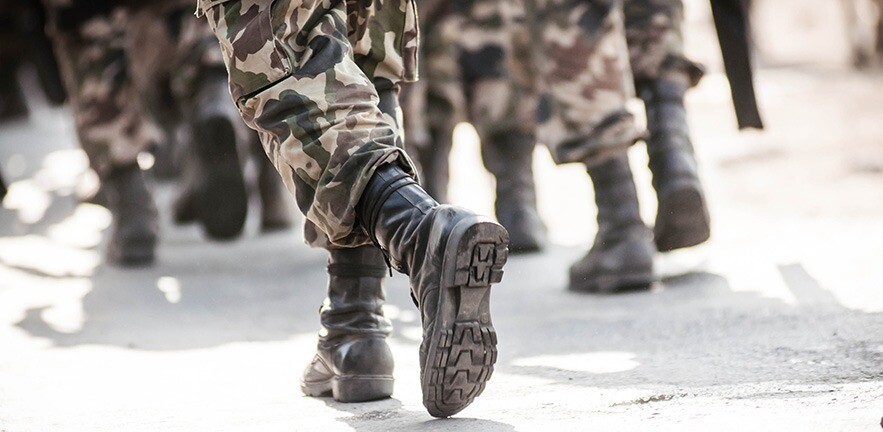Switching from a military background to the corporate world might seem like a leap of faith, but the skills gained from military training – not least leadership, teamwork, and the ability to work under extreme pressure – are key to success in the business sphere.
We spoke to two MBA alumni from Cambridge Judge Business School (CJBS) to get their first-hand experience on how a military background helped them succeed in the MBA and beyond, and how the programme helped them bridge the gap between these two different worlds.
Leading and inspiring others

“At the heart of any successful business is leadership that inspires colleagues to achieve a common goal – and the military is based on the same principle,” says Guy Sustiel (MBA 2014), Head of EMEA Strategy and Operations at Google, who graduated from the Cambridge MBA programme in 2015 after 11 years in the Israeli Air Force.
“You can’t just pull a rank on someone,” he says. “You need to inspire them. Leadership is all about taking care of people and motivating them to go with you. I think people who have trained in the military are more sensitive of people – being there for your people is in our DNA, and that’s crucial to success in the business world.”
“But there are some differences within that,” says Will Maxted (MBA 2021), a recent MBA graduate and Associate at Mckinsey & Company and former Captain of the Parachute Regiment in the British Army. He says the MBA programme at Cambridge Judge has helped bridge that gap.
“Although leadership in the military has moved away from a transactional style of leadership to the transformational style – it’s less shouting orders and more about trying to get the best from your team – you’re still ultimately going to do what the person above you asks,” he says.
“From what I’ve come to understand, hierarchy isn’t always as rigid in the corporate world, and the Cambridge MBA has helped me to get used to that way of working a bit more.
“For example, on the Cambridge Venture Project (CVP), there was no-one in charge,” he says. “You really had to work together within your team to solve challenges together, without anyone being a clear leader. That was a big change from the military.”
Working as part of a team

But the military is all about effective teamwork, of course; learning to support others and put the needs of the team above your own, says Will.
“One of the values you learn in the army is selfless commitment,” he says. “For example, if you’re delivering a big project, you aren’t just thinking, I want to get the bonus and be seen to be the best and leave those struggling to deal with it themselves. You go and help them, so the team does better overall. That’s useful both on the MBA itself and in the corporate world more generally.”
That said, there’s a clear distinction in the way those teams function. A business setting isn’t the same as a battlefield, and communication within a team tends to be different, according to Guy.
“From my experience, there is something a bit more delicate about the way people express themselves in a business culture,” he says. “Also in the military, decisions are always being taken immediately.
“In the business world, especially at Google, where consensus is everything, decisions aren’t always made on the spot. We sometimes sit on an idea for a while, often polling others in the business to get their viewpoint. So, there is something about doing things a bit more fluidly and softly, and the MBA helped me to understand that a bit more.”
Collaborating with different cultures
The modern military isn’t just about working with your own team, of course. International collaboration under the likes of NATO is crucial – and the nature of serving overseas means you get used to being able to adapt to different cultures in a way that’s hugely transferrable to the business world, says Will.
“In the British army, you often work in regions where you’ve had no real exposure to the people before, collaborating with groups of local people to address their issues and achieve a common goal,” he says. “You’re operating in an environment where it’s a completely different culture to the one you grew up in, so you have to be able to understand different perspectives and to engage them to work with you. That’s an obvious crossover with the corporate world, especially if you’re working for a global company,” he says.
But that depends on your individual experience, says Guy, who points to the fact national forces themselves tend to be homogenous.
“Although in the Israeli Air Force I did fly alongside other nationalities sometimes, within your team you’re normally working with people from the same culture,” he says. “On the MBA at Cambridge Judge, you might have more than 50 nationalities in a class of about 200 people, so that was a big difference,” he says.
“Being able to work in an international landscape, and effectively communicate and collaborate with people from so many different cultures, countries, and religions, was probably the biggest thing I took from the Cambridge MBA.
“Today I manage a team with multiple nationalities, so knowing how I come across in different cultures and understanding people from different backgrounds has been hugely beneficial.”
Staying focused and adapting under pressure
Equally crucial to success in the military is the ability to stay focused and complete a mission, says Guy – and that translates into business success too.
“In the business world, there are noises everywhere – deadlines, different opinions and financial constraints, to name a few,” he says. “Organisations contain so many challenges, so being able to cut through the noise, keep your eye on the ball and deliver is really important.
“For someone who has grown up on the operational side of the military, completing a mission is basically everything,” he says. “There’s something about that mindset that has really helped me in my corporate life, both on the MBA itself and in my current role.”
It also sets you up to manage a crisis and adapt a plan accordingly, says Will – and the COVID-19 pandemic has shown the importance of being able to do just that in a business context.
“There’s an expression in the military that no plan survives first contact with the enemy, which basically means that you can have the best plan in the world, but then as soon as you try to implement it, something unexpected happens and suddenly it’s no longer valid,” he says. “That happens in the military on an almost daily basis, so you must become very robust and adaptable and get used to working quickly under pressure, often in a crisis.
“That happens on the MBA and in the business world too, so being able to innovate on the spot is important. I think military people are very good at finding creative solutions to problems they haven’t been trained to deal with.”
Building your brand
But while the military excels in preparing you for unexpected situations, what it doesn’t necessarily train you on is how to present yourself in a business context – and attract these employers in the first place, says Guy.
“You need to learn how to introduce yourself, how to apply for a role and how to effectively prepare for an interview,” he says. “Alongside gaining hard skills like finance, marketing, and business strategy – which I didn’t have experience in before – how to shape my brand and successfully manage my career is one of the biggest things the MBA at Cambridge taught me.
“It also gave me the chance to work with some incredible people and to meet global corporates like Google, which helped me get where I am now. It helped me to close the gap between military training and the business world – because there is a gap to close, and it does take work. But if you invest the time, you take your mission-oriented mindset and you give 100% of yourself to the MBA learnings and experience, success is almost guaranteed.”


